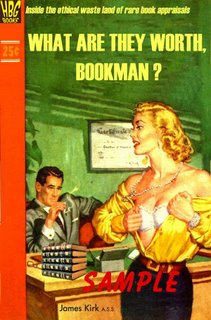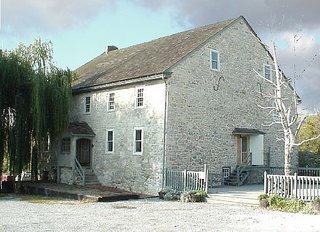How did you get into the Book Business?

Long Story - Medium Length Version
PART V
On April Fool's 1971 day we moved from Philadelphia to a farm near Glen Rock, in Southern York County Pennsylvania. This was our beloved home for the next 28 years. It was a beautiful, cozy, isolated spot. I had the time and space to read and study: books about books; bibliography; book arts; book binding; the taste and technique of book collecting; methods and modes of illustration; printing history and procedures; and the rare book marketplace.
And I had hours and hours to spend each week with AB.
AB Bookman's Weekly was the bible of the American used and antiquarian book trade. It was started in 1948 by Publishers Weekly, which covered the out-of-print trade through a regular column by Sol Malkin, but wanted to expand into classified listings of books for sale and books wanted. Malkin became the editor of the new magazine, Antiquarian Bookman, and bought it from PW a few years later. The name changed to AB Bookman's Weekly in 1967. That was the year that Sam Klineman first showed me a copy. It was a small magazine, filled with dense type in double columns, mainly listing BOOKS WANTED. At the back there were similar listings of BOOKS FOR SALE (where some real bargains were found). The editorial matter in the front was also interesting, as it was filled with: book facts and lore; news of book fairs and exhibits; calendars; and other things of interest to collectors, librarians, and book sellers.
But its most important and bulky content were those BOOKS WANTED ads. Thousands of booksellers - large and small - scanned these pages weekly (actually, about 6000 were regular readers of the ads). Through a quick but careful reading they would mark off books they thought they had in stock. They would then "quote" the book to the bookseller seeking it. These 'quotes' describing the details of the book in hand were usually written on a postcard. Though the exact format differed, the usual information (author, title, publisher, place, date, illustrations, binding, and condition) fit nicely on a regular postcard. I had a rubber stamp made up so that I just had to fill in the blanks. Some others used pre-printed forms. Many just scrawled the information by hand in the postcard space (using pens, pencils, and even crayons). There was one 'quoter' who used to send what amounted to original watercolor drawings! Regular advertisers got hundreds of post cards a week in response to their wants.
I was a random 'quoter' - usually going to the trouble only when I was pretty sure that the book sought was rather scarce. For common books, seekers were likely to get 50 or 100 postcards, choosing the best and cheapest copy from among them.
It was a dealer to dealer only club, and through AB I made many contacts and sold a fair number of books. By advertising in the 'wants' I was also able to find scarce books for my own growing list of clients - and got to know the quoting style of many other booksellers. It was fun.
I would sit on the porch at the farm and scan these columns of 'wants' and 'for sale' whenever I had the chance. Watching our horses in the pasture, seeing fat steers munching away at the grass, listening to the frogs and crickets, and observing birds flying over the woods - my mind would often drift. Those columns of book titles (in one short line each) required intense concentration ... unless superficial review and a reliance on serendipity was more to your liking. I wobbled between the extremes, but fell more in with the lovers of serendipity.
"Bookselling is a very pleasant way to make very little money."
Well - one especially luscious late spring day - I was scanning AB as usual. My wife was beside me and I said to her, for the first time ever, "I think I'd like to do this (buy and sell old books) when I retire." She said, "Good idea," and went in to stir something in a pot for supper.
She was gone long enough for a life changing thought to form in my mind, and when she came back out, I said "You know - it seems silly to labor thirty or forty years at a job you hate - to then retire to do something you love." (By this time I had risen high in Chiquita Banana's Institutional Sales Department - but hated the job). "How much worse off would we be if I left 'work' and became a full-time bookseller ?" "Do you mind if I try now?" She said, "It's OK with me," in a way that really said, "How come it has taken so long for you to have this realization?"
We had $ 2000.00 in the bank and a few shelves of books. I told her that when the bank account falls below $ 1000.00 - I'll go look for a "regular" job. She said, "Fine."
The next weeks passed almost as they had before... only the bank account kept going down - little by little. Even without the distractions of Chiquita, it was tough to generate much immediate income from my scouting forays and AB quoting labors. As the third month of "on my own full-time" began, I knew that our bank account was below $ 1000.00. I did not say anything to Belle.
Several years later she asked, "How low did the account go?" I told her that it was just dropping below $ 700.00 (and I had begun glancing at the employment pages of the newspaper) when things started picking up. She said, "I thought so... but I was praying that you would not stop and would stay with it." "My prayers were answered."
THE END: "How did you get into the Book Business?" Long Story - Medium Length Version. In 5 Parts.






